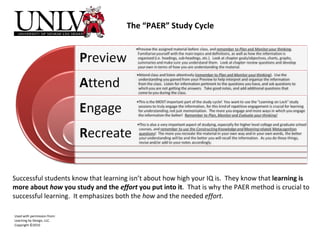
Unlv Paer Learn Lock
- 1. The “PAER” Study Cycle Successful students know that learning isn’t about how high your IQ is. They know that learning is more about how you study and the effort you put into it. That is why the PAER method is crucial to successful learning. It emphasizes both the how and the needed effort. Used with permission from: Learning by Design, LLC. Copyright ©2010
- 2. “Learning on Lock” Study Sessions “Learning on Lock” Study Sessions (30-50 minutes sessions) 1. Read the material again, but this time, read for understanding and not familiarity. Read in 15-25 minute periods. Look for answers to the questions you noted earlier. Study the graphs, charts and other visual aids and understand how they relate to or support the main points of the material 2. After each period of studying, take 5-10 minutes and reflect on the material. What are the main points? How does this relate to what you have learned from earlier classes and courses? What does the instructor view as important from the information and why? 3. Go back through the information and take notes (10-15 minutes). Note the main points, the important concepts and the visual aids that may help to explain them. You can highlight, underline, or even better – write and organize your notes in your own words on paper or on your computer in ways that are comfortable and allow you go easily find and engage your notes later. 4. “Rinse and Repeat” – do this several times a. Once immediately after class (within 24 hours) b. Daily - 1-2 times per class, every 48 hours c. Weekly – use one study session and take a little extra time to “wrap up” the week’s notes. Review and summarize all of your notes for the week for each class. (Do the same for exam prep with all of your notes!) 5. Take some time after each study session to evaluate your thinking and your study strategies using the Evaluation and Self-Assessment related metacognition questions. Strategies for Recreating Various strategies you can use in any combination to Recreate the information • Reciting – stating out loud (by yourself, to a friend, podcast, etc.) or writing the key pieces of information, key words/concepts, etc. from scratch and in your own words. • Discussion / Debate – discuss the key information with other students and/or friends. Find out how others are making sense of the material, how they are organizing the information, etc. Discuss overall themes, relationships and controversial points. Take controversial topics or perspectives and debate them. • Teach – teach someone else the key information, key concepts, and how the different information and concepts relate each other • Test yourself – create your own tests. The metacognitive questions related to “expert questions,” paraphrasing, and the “Constructing Knowledge and Meaning” are perfect for this! • Write your own chapter summary – use your daily and weekly notes to write your own chapter summary. Used with permission from: Learning by Design, LLC. Copyright ©2010